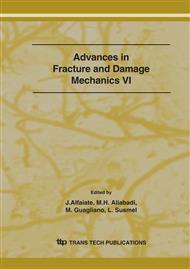p.861
p.865
p.869
p.873
p.877
p.881
p.885
p.889
p.893
Slow Strain Rate Tensile Testing for Evaluating Stress Corrosion Cracking of Type-40Cr Steel in the Acidic Chloride Solution
Abstract:
This paper investigates application of slow strain rate tensile (SSRT) testing as a laboratory method to characterize stress corrosion cracking (SCC) susceptibility of type 40Cr steel in the acidic chloride solution. SSRT testing was carried out at room temperature in acidic chloride solution and seawater at different strain rates (3.82×10-7 to 1.41×10-6 s-1),respectively. The results show that the type 40Cr steel is susceptible to stress corrosion cracking in a certain strain rates (around 1.41×10-6 s-1) in the acidic chloride solution. In tests performed at this strain rate (1.41×10-6 s-1), while the specimens are not susceptible to SCC in seawater. Typical intergranular attack is seen on the fracture surface of the former that had failed due to SCC, and the latter had underwent considerable necking before fracture, also represented by high reduction of area (RoA) and fractographic feature of dimples consistent with ductile failure. Additionally, the results are consistent with the data of electrochemical noise (EN) that is generated of type 40Cr steel exposed to the acidic chloride solution and seawater. This study also supports SSRT and EN technique as an effective testing technique for SCC studies.
Info:
Periodical:
Pages:
877-880
Citation:
Online since:
September 2007
Authors:
Price:
Сopyright:
© 2007 Trans Tech Publications Ltd. All Rights Reserved
Share:
Citation:


